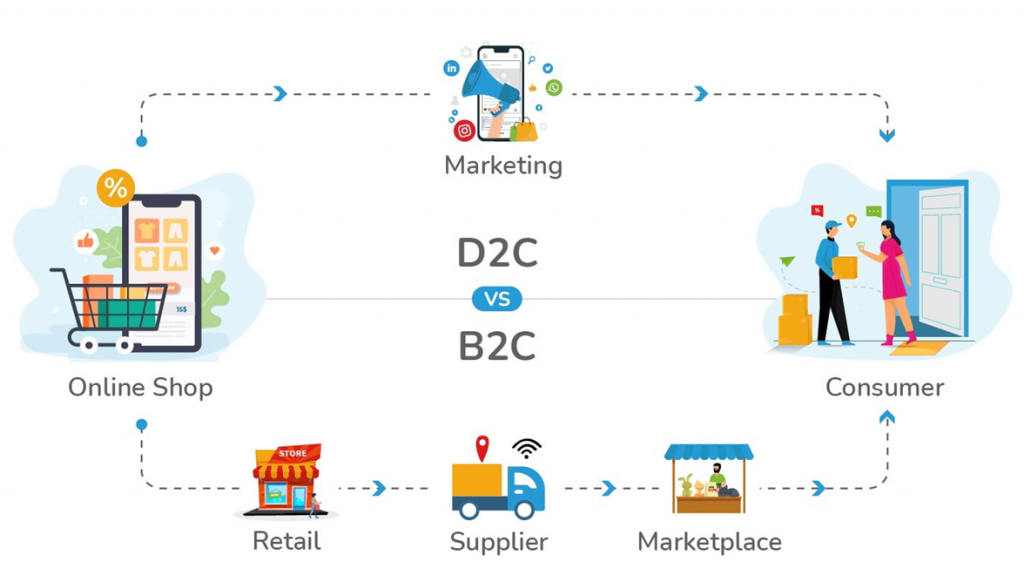Direct To Consumer (D2C)
Successful and distinctive eCommerce strategies
In this article, we will delve into business models, specifically the Direct To Consumer (D2C) model.
What is D2C?
D2C is a business model where manufacturers or businesses sell their products and services directly to consumers, bypassing intermediaries like distributors, retail chains, or stores.
What are its pros and cons?
Pros:
- Higher Margin: The D2C model eliminates the need for multiple middlemen, resulting in a higher margin for the business.
- Marketing Control: Businesses have complete control over marketing efforts and product positioning, allowing for differentiation from competitors.
- Better Customization and Adaptation to User Needs: D2C provides visibility into user needs, enabling data analysis for personalized offers and product/service adaptation.
- Direct Customer Feedback: Delivering products and services directly to customers facilitates valuable feedback and enhances customer connection.
- Flexibility and Speed: D2C businesses can swiftly respond to changing market conditions and introduce new products and services without traditional distribution constraints.
- Low Storage Costs: D2C businesses benefit from reduced storage costs compared to traditional distribution.
Cons:
- Requires Significant Investment in Website and Marketing: Successfully running the D2C model demands investment in websites, online marketing, and technology resources, which can be costly.
- High Competition: The growing popularity of D2C businesses intensifies competition, making it challenging to acquire customers and establish a brand.
- Limited Visibility Due to Lack of Physical Presence: D2C businesses may face difficulties in building a brand due to the absence of physical stores.
- Logistical Challenges: Managing delivery and order processing can pose logistical challenges, especially with larger order volumes.
- Constant Innovation and Renewal: To compete effectively, D2C businesses often need to innovate and offer unique products or services, requiring substantial research and development efforts.
D2C strategies
Building a website or online store
Creating your own website/online store allows the manufacturer to offer their services directly to customers. Through it, the manufacturer has the opportunity to – full control over the customer experience, margin diversification, branding opportunity, standing out from the competition, development of a specific brand/series, development of its online presence, better awareness of consumer behavior, faster solutions when the market changes.
Marketing and Social Media
Digital marketing is an essential tool for reaching customers. It enables:
- Building and developing the brand;
- Differentiation from the competition;
- Better control over advertising costs;
- Ability to creatively present the products/services;
- Possibility of personalized ads, email marketing, etc.;
- Adaptation to the needs of the target audience;
- Quick feedback from customers and the possibility of direct communication with them;
- Building loyalty.
Subscription services
The subscription service model, where customers pay regularly to receive products or services, can be applied across industries. What are its advantages?
- Stable income;
- Longer-term customer relations;
- Lower marketing costs for customer retention;
- Possibility of investing more funds to attract new customers;
- Ability to collect data on customer preferences and analysis.
Physical stores and exhibitions
Combining an online presence with your own physical stores or showrooms allows you to create a multi-channel experience for customers. This approach:
- Increases brand/business visibility;
- Increases product availability;
- Enables the preparation of shipments to be picked up directly from the store and thus saves delivery costs;
- Improves communication with customers, as it monitors their behavior during the purchase;
- Gives information about what the customer is interested in, which can improve both the way the product is presented and the online communication.
Personalization
Personalization is of utmost importance in order for the business to meet the specific needs of the customer.
What are its advantages:
- Possibility of personalization of the product/service;
- Increasing the client’s trust;
- Increase satisfaction;
- Building high loyalty.
More and more businesses rely on deep personalization for each customer to create a luxurious and unique user experience and bring a sense of exclusivity.
Successful D2C companies

Yves Rocher
A French natural cosmetics brand that focuses on producing cosmetics with a maximum % of natural plant ingredients, in recyclable packaging.
It provides its products through its physical boutiques, their online store, Lilly drugstores, local pharmacies, Fantastico stores and other online stores.
They implement the D2C model, building local online stores in the countries where they sell their goods.
Dollar Shave Club (retail)

Dollar Shave Club is an American company that provides subscription services for shaving and hair care, and it became known for its innovative and successful campaign. What they do:
- Funny video ads presenting the products and their subscription plans in an interesting way;
- Transparent prices and a simplified subscription model;
- Personalization and convenience when choosing a product according to the needs and preferences of the user;
- Inspirational content on social networks;
- Regular delivery directly to the user’s door.
The results are impressive – attracting millions of customers and impressing the world with their D2C delivery model.
Tesla

They use the D2C model in several aspects:
- Sale of cars directly to customers, through own stores and online platform;
- Ability to configure the car;
- Provides solar panels and energy storage products;
- Software upgrade program à car improvement and loyalty incentive;
- Communication with customers through the software interface, e-mail communications and social media, which ensures quick resolution of questions and problems;
- Additional products and services – Tesla Insurance, Tesla Energy, etc.
HelloFresh

HelloFresh is a global company specializing in the delivery of ready-to-cook foods directly to its customers’ homes.
- Provide kits with ingredients and recipes that are ready to cook at home, giving customers everything they need to prepare delicious home-cooked meals.
- Personalization: Customers can choose from a variety of recipes and menus that suit their tastes and dietary preferences.
TaskRabbit (B2B)
TaskRabbit is a well-known marketplace for services. The platform allows customers to hire local helpers to handle various tasks and projects such as furniture assembly/disassembly, housework, moving, gardening, etc.
The D2C model is included here, providing a direct link between customers and helpers without any middleman.
Glossier

A cosmetic brand that successfully implements D2C strategies. Here’s how:
- Sells its products through its own online platform;
- Glossier actively collects feedback from its customers and uses the information to customize products and create products that meet customer needs;
- Builds a strong community through interactive campaigns and social media content;
- Manage the supply of your products -> Fast and reliable delivery;
- Combining their online store with their own stores and pop-up stores.
Zappos (Customer Service)

Zappos is one of the leading online shoe and apparel retailers. They are known for their exceptional customer service, thanks to their 365-day, no-questions-asked money-back guarantee. This approach demonstrates their high trust in customers and convinces them that they can shop without worry.
In 2009, it became part of Amazon, retaining its independence and management style. Today, Zappos continues to be known for its high level of customer satisfaction and service.
Casper

A well-known manufacturer of mattresses and bedding. It sells its products directly, based on online sales and its own physical stores. Thus, it eliminates the need to offer competitive prices.
It focuses on informing customers so they can make the best choice.
It includes a long warranty period and the option to return if the customer is not satisfied.
It includes constant innovative production techniques and product technology for its improvement.
Allbirds

A shoe brand known for its focus on the durability and comfort of its products.
- Sells its products directly, based on online sales and own physical stores.
- Stands out for its commitment to sustainability and ethical production.
- Strives to produce shoes that are comfortable and functional for everyday wear, combining design and comfort.
Peloton

Peloton is known for its innovative products and services in the field of fitness and health. It successfully implements the D2C model as:
- Sells fitness equipment directly through its website and stores.
- Provides subscription services, including online training and live classes.
- Have their own app that complements the fitness equipment and allows customers to access workouts, guides and the Peloton community through their mobile device.
- Invests in customer service and provides support through various channels, incl. phone, chat, email.
- Customizes training and content offerings based on customer data.




